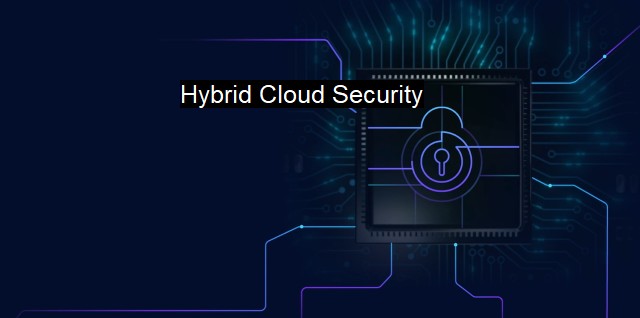What is Hybrid Cloud Security?
Hybrid Cloud Security: Revolutionizing Cybersecurity for Business Operations in the Age of Cloud Computing
Hybrid cloud security refers to the measures, solutions, and systems applied to maintain security, integrity, and privacy of data and operations contained across a mixed private and public cloud structure – that's the so-called hybrid cloud. In the evolving landscape of cloud technology, the hybrid cloud is seen as a revolutionary approach that expands the capabilities and flexibility of entities using cloud services. But these new potentials also bring along the challenge of securing this complex environment.Hybrid cloud security necessitates a comprehensive approach as it covers numerous terms, from resources structured in a private in-house data center to a hosted environment or data located in the public cloud segment. The composition of resources across on-premises, privately-hosted, and public cloud assets require a streamlined security approach that could guard the entirety of the hybrid cloud without undermining the specific security elements of each part.
The adoption of the hybrid approach is driven by considerations of cost-effectiveness, improved agility, scalability and enhanced workflow processes including data analysis, storage, and back-up. Some legislative obligations may also require businesses to store certain sensitive information in private clouds. But as all hybrid cloud assets are not in one place, strategies aimed at thwarting attacks of each individual infrastructure piece could prove vastly ineffective and might even expose the hybrid cloud to higher levels of threat.
Safeguarding the hybrid cloud requires continuous monitoring and dynamic security strategies that protect data and applications without hampering accessibility and use. Organizations need to secure their hybrid architectures from both external threats, like malware or hacking attempts, and internal threats, such as accidental data leaks or poorly-configured security controls.
Application or workload-based security is a vital aspect of hybrid cloud security. With the hybrid scenario, a multitude of applications housed in different environments necessitates consistent policies across the entire cloud ecosystem. Understanding the threat scenario and determining which workloads are at risk is crucial for the implementation of intelligent security practices, including antivirus and anti-malware scan. Individual specifications of sensitive workloads entail intricate security provisions including encryption, intrusion protection systems and vulnerability assessment for secure functioning.
User access control is another key area. In the hybrid cloud environment, various entities – inside or outside the organization – may need to access applications and sensitive data. An unauthorized access could pose severe risks. Therefore, organizations must validate identities and regulate access using means such as multi-factor authentication and maintain detailed records of all access events and configurations.
On top of these, it is important for an organization to focus on network security. Protecting the connectivity between various environments within a hybrid cloud is crucial – both virtual and physical. Firewalls, network segmentation, secure virtual private networks (VPNs) and other network security tactics need to be deployed in order to ensure that data is transported securely within and between the environments.
It's also common for some businesses to overlook compliance requirements while transitioning to a hybrid cloud model. Non-compliance and potential violations of pertinent regulations could result in substantial legal penalties as well as reputation damage.
Hybrid cloud security needs to be considered from end to end starting from the platform layer, traversing through process rules, individual applications and crucial data object levels to ensure complete security across the entire spectrum. To address the versatility and dynamism of the hybrid cloud, organizations should choose holistic and evolutionary security strategies that provide dismantled and well-coordinated security layers against changing threat patterns in the complex hybrid landscape.
A true hybrid cloud security implementation not only decreases risk but also helps to extract the full potential of computing resources safely to achieve the desired business outcomes and uninterrupted continuity. Organizations that sharpen their focus on hybrid cloud security are, therefore, bound to stay at the forefront of innovation and reap the ever-expanding rewards of cloud technology.

Hybrid Cloud Security FAQs
What is hybrid cloud security?
Hybrid cloud security is a cybersecurity approach that aims to ensure that data and applications are protected across both private and public cloud environments. It combines the security measures of both cloud environments to provide a more comprehensive and robust security solution.What are the benefits of hybrid cloud security?
The benefits of hybrid cloud security include improved flexibility, scalability, and cost-effectiveness. It also allows organizations to take advantage of the benefits of both private and public clouds while maintaining control over their sensitive data.What are some common security challenges associated with hybrid cloud environments?
Some common security challenges associated with hybrid cloud environments include data breaches, cloud provider vulnerabilities, lack of visibility and control, and compliance issues. It's important to implement proper security measures and strategies to mitigate these risks.What are some best practices for ensuring hybrid cloud security?
Some best practices for ensuring hybrid cloud security include implementing multi-factor authentication, using encryption, regularly monitoring and auditing access and usage, implementing a strong incident response plan, and partnering with a trusted and experienced cloud security provider.| | A | | | B | | | C | | | D | | | E | | | F | | | G | | | H | | | I | | | J | | | K | | | L | | | M | |
| | N | | | O | | | P | | | Q | | | R | | | S | | | T | | | U | | | V | | | W | | | X | | | Y | | | Z | |
| | 1 | | | 2 | | | 3 | | | 4 | | | 7 | | | 8 | | |||||||